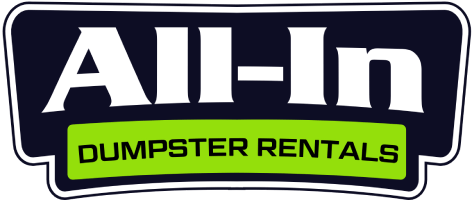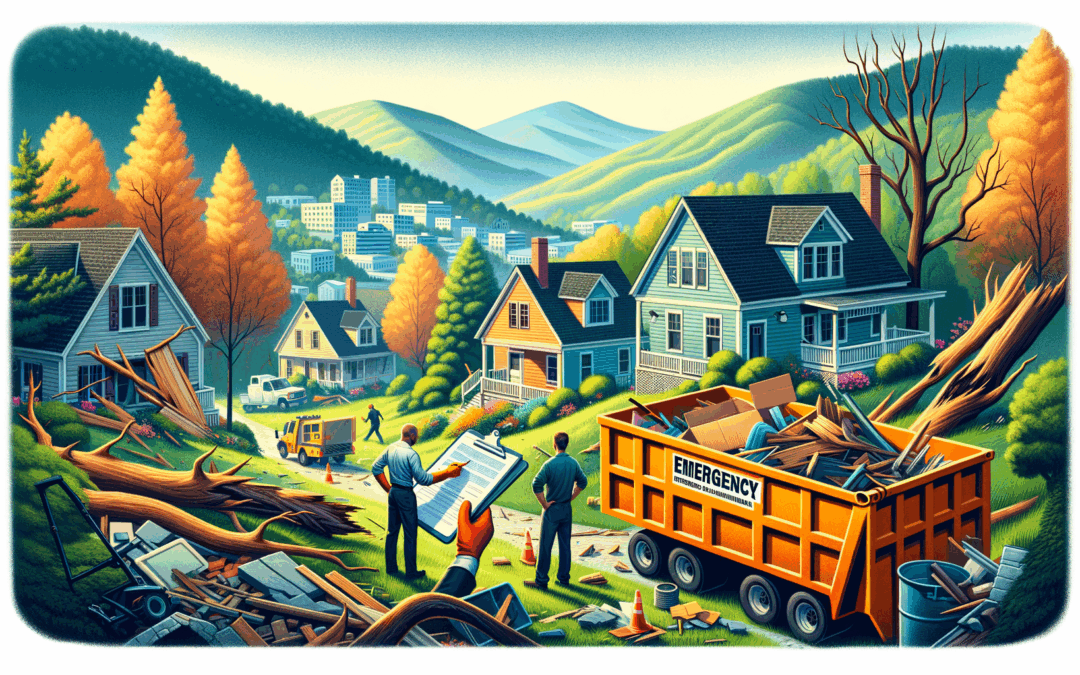When Mother Nature unleashes her fury on Western North Carolina, the aftermath can be overwhelming. Fallen trees, waterlogged belongings, damaged siding, and debris scattered across properties become an unfortunate reality for many Asheville residents and those in surrounding communities. During these challenging times, having access to reliable emergency waste management solutions isn’t just convenient—it’s essential.
Here in the Blue Ridge Mountains, we’ve seen our share of severe weather events. From the remnants of hurricanes tracking inland to sudden summer thunderstorms that bring down centuries-old oaks across Buncombe County, to winter ice storms that can leave Weaverville and Woodfin homes damaged, storm cleanup is a familiar but daunting task. As a family-owned business serving the Asheville area, we’ve helped countless neighbors transform chaotic post-storm situations into manageable recovery projects with our emergency dumpster rental services. In addition to our rental services, we also provide valuable storm recovery tips for homeowners, ensuring that everyone feels prepared and supported during the cleanup process. From organizing debris to understanding local regulations for disposal, our expertise can make a significant difference. Our commitment is to not only provide practical solutions but also to foster a sense of community resilience in the face of nature’s challenges.
The Unique Challenges of Storm Cleanup in Asheville
Storm cleanup in Asheville and surrounding areas presents unique challenges compared to other regions. Our mountainous terrain can intensify storm damage, with runoff creating erosion and tree removal becoming complicated by steep property layouts. The combination of our lush forest canopy and mountainous topography often means more organic debris than many homeowners anticipate.
Local residents know that when storms hit areas like Fairview, Fletcher, or Candler, the cleanup needs can vary dramatically based on elevation, tree coverage, and proximity to waterways. A property in Arden might primarily deal with fallen branches, while a home in Bat Cave or Chimney Rock might face more serious challenges with mudslides or flood debris.
What makes storm cleanup particularly challenging is the unpredictable timing and the sudden urgent need for disposal solutions. Unlike planned renovations or scheduled cleanouts, storm damage requires immediate attention to prevent further property damage, address safety hazards, and begin the recovery process.
Why Emergency Dumpster Rentals Are Critical After Storms
When severe weather strikes Western North Carolina, the recovery timeline is crucial. Here’s why having access to emergency dumpster rentals makes a significant difference:
Safety First: Storm debris creates hazards on your property. Broken glass, splintered wood, torn metal, and water-damaged materials can pose serious risks to family members and pets. Having a designated container allows for quick removal of dangerous items.
Preventing Secondary Damage: Water-damaged materials need prompt removal to prevent mold growth—a serious concern in our humid climate. Wet drywall, insulation, carpeting, and furniture can begin developing mold within 24-48 hours. Quick disposal helps limit this secondary damage.
Insurance Documentation: Having an organized approach to debris removal helps with documenting damage for insurance claims. Taking photos of debris before disposal and keeping track of what’s being removed provides valuable evidence for your claim.
Streamlining Recovery: With a dumpster on site, cleanup crews or volunteers can work efficiently without making repeated trips to distant disposal facilities. This dramatically speeds up the recovery process.
Types of Storm Debris Commonly Handled in Asheville Area Cleanups
Storm cleanup in the Asheville region typically involves several categories of waste, each with specific handling requirements:
Vegetation and Organic Debris: Our heavily wooded areas in places like Mars Hill, Old Fort, and Lake Lure often see massive amounts of branches, leaves, and even entire trees needing removal after storms. While some organic material can be composted or mulched, larger quantities require proper disposal.
Construction Debris: Damaged siding, roofing materials, broken deck boards, fence sections, and other building materials are common after high winds or falling trees impact structures. These materials often contain nails and other fasteners that require careful handling.
Household Items: Flooding in low-lying areas of Henderson County or along waterways in Waynesville can damage furniture, appliances, clothing, and other personal belongings. Water-damaged items often need prompt disposal to prevent mold issues.
Mixed Debris: Many storm cleanups involve a combination of all these materials, which is why having a flexible waste management solution is so important.
Choosing the Right Dumpster Size for Storm Cleanup
The scope of storm damage varies widely across Western North Carolina. A minor windstorm might leave your Flat Rock property with just a few branches down, while a major flooding event could leave homes in Etowah or Edneyville with extensive damage requiring substantial cleanup.
For moderate storm cleanup involving primarily yard debris and some damaged household items, our 10-yard dumpsters often provide sufficient capacity. These compact units fit well in residential driveways while still offering enough space for a substantial amount of debris.
More extensive damage often calls for our 13-yard or 15-yard options. These larger containers are appropriate when dealing with structural damage, multiple fallen trees, or flooding that has affected interior spaces and contents.
The mountainous terrain and narrow driveways common in areas like Gerton or Enka sometimes present access challenges. Our local experience means we understand these unique considerations and can recommend appropriate solutions based on both the volume of debris and the specific access constraints of your property.
The Emergency Response Process
When storms hit Western North Carolina, our emergency response process kicks into high gear. Here’s what local residents can expect when arranging emergency dumpster rental services:
Extended Availability: Unlike many waste management companies, we maintain extended hours (6:30 am to 7:00 pm, 7 days a week) specifically to accommodate urgent situations like storm cleanup.
Priority Scheduling: We prioritize emergency situations, understanding that storm cleanup can’t wait for regular scheduling windows. Our team works to redirect resources where they’re most urgently needed.
Flexible Placement: Storm situations sometimes require creative solutions for dumpster placement, especially when normal access points might be blocked by fallen trees or flooding. Our delivery specialists are experienced in finding workable solutions even in challenging circumstances.
Damage-Preventing Practices: We take extra precautions during emergency placements to protect driveways and property from additional damage during the cleanup process. Our delivery methods include protective measures for your property surfaces.
Navigating Insurance Claims for Storm Cleanup
For many Western North Carolina residents, storm cleanup costs may be partially covered by homeowners insurance, particularly when structures have been damaged. Successfully navigating this process requires some preparation:
Before beginning cleanup, document everything thoroughly with photographs and videos. Capture the full extent of the damage before any debris is moved or removed.
Contact your insurance provider promptly to report the damage and understand your coverage details. Ask specifically about debris removal coverage, as policies vary significantly.
Keep detailed records of all expenses related to the cleanup, including dumpster rental receipts, contractor invoices, and any equipment rentals or supplies purchased.
If your insurance adjuster recommends specific vendors, ask whether you can choose your own local service providers instead. Using familiar local companies often results in better service and more appropriate solutions for our unique regional challenges.
Community Resources for Storm Recovery
Beyond debris removal, comprehensive storm recovery often requires additional support. Western North Carolina residents should be aware of these valuable resources:
Local emergency management offices in Buncombe, Henderson, and Haywood counties often coordinate recovery efforts after significant events. These agencies can provide information about available assistance programs.
Community organizations throughout the region frequently mobilize volunteer cleanup crews after major storms. Churches, civic groups, and neighborhood associations in communities from Canton to Hendersonville often coordinate these efforts.
For those with limited physical ability or financial resources, programs exist to provide assistance with storm cleanup. Local social service agencies can provide referrals to appropriate resources.
Working with neighbors to share dumpster costs can make recovery more affordable for everyone. Group rates may be available when multiple properties in areas like Mountain Home or Woodfin need cleanup services.
Environmental Considerations in Storm Cleanup
As residents of one of America’s most beautiful natural regions, Western North Carolina locals understand the importance of environmentally responsible waste management, even during emergencies.
When possible, we encourage sorting debris to maximize recycling opportunities. Clean wood waste, metal, and certain plastics can often be diverted from landfills.
Hazardous materials require special handling. Items like paints, chemicals, batteries, and electronics damaged in storms should be separated and disposed of according to local regulations rather than placed in dumpsters.
Some organic debris from storms can be repurposed. Uncontaminated branches and trees may be turned into mulch or firewood rather than treated as waste.
We work closely with local waste management facilities to ensure storm debris is processed according to environmental best practices, minimizing the ecological impact of these unfortunate events.
Planning Ahead for Future Storms
While emergency response is essential, preparedness can make future storm recovery much smoother. Consider these proactive steps:
Establish a relationship with a local dumpster rental company before an emergency occurs. Knowing who to call and understanding the services available saves precious time when storms hit. By proactively reaching out, you can also discuss specific needs like size and type of container that would be best suited for your situation. This foresight becomes even more crucial when evaluating dumpster rental options after storms, as demand often surges and the best services may quickly become booked. Having a plan in place ensures you can efficiently manage debris and waste, allowing for quicker recovery and clean-up efforts.
Create space on your property where a dumpster could be placed in an emergency. Identifying suitable locations in advance prevents complicated decisions during stressful situations.
Maintain an emergency contact list that includes waste management services alongside other critical providers. Store this information where it can be accessed even during power outages.
Consider preventative measures like regular tree maintenance to reduce potential storm damage. Removing dead branches and unhealthy trees before storm season can significantly reduce cleanup needs.
The Local Advantage in Storm Response
When recovering from storm damage, working with a local, family-owned business offers distinct advantages over national chains. We understand the unique challenges of cleanup in the Blue Ridge Mountains because we live and work here too.
Our team knows the area intimately—from the winding roads of Weaverville to the steep driveways in Fairview. This local knowledge translates to faster service, more appropriate equipment choices, and better placement options for dumpsters during emergency situations.
As your neighbors, we witness firsthand how weather affects our communities. When ice storms hit the higher elevations or flooding affects valleys, we’re experiencing these same challenges alongside you, giving us a personal investment in supporting quick, effective recovery.
Weather events in Western North Carolina don’t follow standard business hours, which is why our extended availability is so important for storm response. When you’re facing property damage and urgent cleanup needs, having a responsive local partner makes all the difference.
Moving Forward After the Storm
The journey from storm damage to recovery can be challenging, but with proper support and resources, Western North Carolina residents can navigate this process effectively. From the initial emergency response through the complete restoration of your property, having reliable waste management solutions remains a critical component of successful recovery.
While we can’t prevent the storms that occasionally affect our beautiful mountain region, we can ensure that cleanup and recovery proceed as smoothly as possible. With proper planning, appropriate equipment, and support from neighbors who understand our local challenges, Asheville area residents can face these difficult situations with confidence.
Remember that beyond the immediate cleanup, complete recovery may take time. Be patient with yourself and your property as you work through this process, and don’t hesitate to lean on community resources and professional services designed to support you through challenging times.
When storms bring unwelcome changes to your property, having a trusted local partner for emergency waste management provides peace of mind during otherwise uncertain circumstances. From Asheville to Waynesville, Canton to Hendersonville, we’re here to help our mountain communities weather any storm—and clean up whatever it leaves behind.

